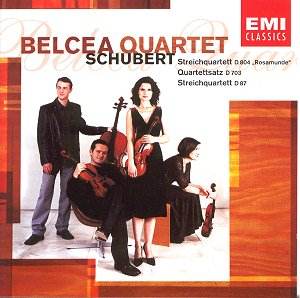
Franz SCHUBERT (1797-1828)
String Quartet in A minor D.804 ‘Rosamunde’ (1824) [36.51]
Quartetsatz in C minor D.703 (1820) [9.32]
String Quartet in Eb D.87 (1813) [26.37]
Rec. Potton Hall, Suffolk in July 2002
BUY NOW
 |
Belcea Quartet Franz SCHUBERT (1797-1828) String Quartet in A minor D.804 ‘Rosamunde’ (1824) [36.51] Quartetsatz in C minor D.703 (1820) [9.32] String Quartet in Eb D.87 (1813) [26.37] Rec. Potton Hall, Suffolk in July 2002 |
|
|
|
||
An overview of Schubert as a writer of string quartets is provided by the Belcea’s commendably imaginative combination for this debut CD for EMI. The composer was a youth of sixteen when he wrote the final quartet they play, and (given his short life of 31 years) comparatively old at 23 and 27 for the other two. Both the A minor quartet and the quartet-movement (which is probably the most familiar work here) are fairly subdued affairs, indeed it is only when we get to the final pair of tracks on the disc that the mood perks up with sprightly, bright speeds and relatively cheerful musical material. That being said, the music is profound, almost symphonic in both structure and texture, with no more than a passing nod at his great predecessors or contemporaries, Haydn, Mozart and Beethoven (Schubert was even younger at thirteen when he tackled his first string quartet). For all the right reasons no doubt, the Belcea Quartet sometimes plays with an excessively exaggerated feel for phrasing, with too much shaping away from the natural stress on the first note followed by the so-called feminine ending. Yet their sense of tension and drama, often achieved through disciplined control of quiet dynamics (Track 3: 1’44"), produces extraordinary results. So too are the magical moments in these glorious works, for example the effortlessly smooth and melting transition from minor to major in the opening movement of the A minor quartet (Track 1: 10’ 12"). | Error processing SSI file |
|
Return to Index |